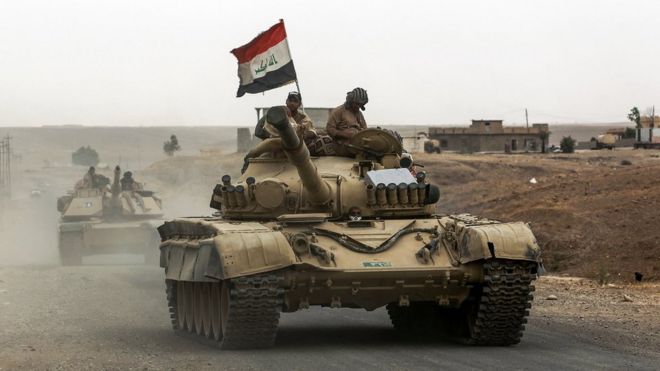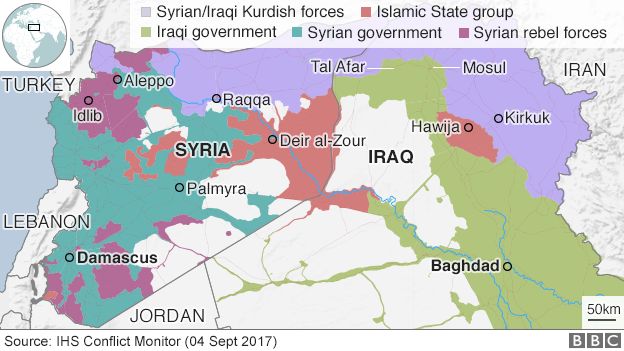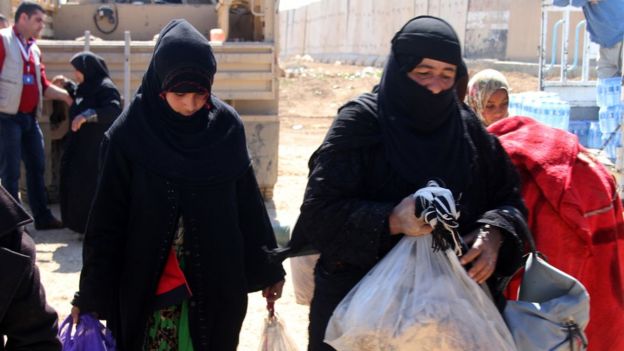 |
| Hawija was surrounded and cut off from other IS-held territory more than a year ago |
Iraq has launched an offensive to expel Islamic State militants from Hawija, one of the last two areas in the country still held by the jihadists.
Prime Minister Haider al-Abadi said the attack on the town, which is 220km (135 miles) north of Baghdad, began at dawn.
A US-led multinational coalition is carrying out air strikes in support.
The operation began just two days after troops moved on the other remaining IS bastion in Iraq - in the western desert close to the border with Syria.
The military says it has already retaken the village of Rihana and is surrounding Ana, one of three towns in that part of the Euphrates river valley held by IS.
Hawija, which lies 50km (30 miles) to the west of the city of Kirkuk, has been a bastion of Sunni Arab insurgents since the US-led invasion of Iraq in 2003.
The town fell to IS in June 2014, when the jihadist group seized control of much of northern and western Iraq and proclaimed the creation of a "caliphate".
But it was surrounded and cut off from other IS-held territory more than a year ago, when government forces advanced north towards the second city of Mosul.

Mr Abadi said he had launched the assault on Hawija on Thursday morning "in accordance with our commitment to our people to liberate all Iraqi territory and eradicate [IS] terrorist groups" and predicted another victory.
Iraqi army soldiers, federal police officers, elite Rapid Response Force troops, Sunni Arab tribesmen and fighters from the Shia-led paramilitary Popular Mobilisation were reportedly advancing on six axes.
The United Nations has warned that an estimated 85,000 civilians living in the Hawija area are at extreme risk and likely to be heavily affected by the fighting.
Save the Children said up to 30,000 children were among the most vulnerable.
 |
| Some 102,000 civilians have fled the Hawija area since August 2016 |
"Food, water and medicine are running out, with many children reportedly weak and malnourished. Schools and hospitals have shut down," said Aram Shakaram, the charity's deputy country director.
"Now families face a terrible choice of staying put as fighting intensifies, or risking their lives to flee on foot for up to 12 hours through minefields and snipers, then wade across a river to reach safety."
Mr Shakaram said it was imperative that Iraqi and coalition forces opened up safe escape routes for civilians, and called on them to avoid the use of explosive weapons in populated areas.
On Wednesday, coalition spokesman Col Ryan Dillon tweeted that the Iraqi air force had dropped three million leaflets over Hawija "urging [IS] surrender and providing safety instructions for civilians".
Preparations for the offensive have been overshadowed by a dispute between the Arab-led central government in Baghdad and the autonomous Kurdistan Regional Government over plans to hold a referendum on Kurdish independence.
Voting is due to take place next Monday in disputed areas claimed by both sides, including Kirkuk, which has sizeable Arab and Turkmen populations.
Mr Abadi says the referendum is "anti-constitutional" and wants it cancelled.
Source: BBCNews

No comments:
Post a Comment
Add a Comment...